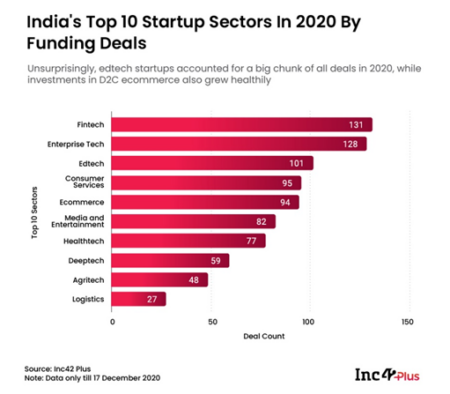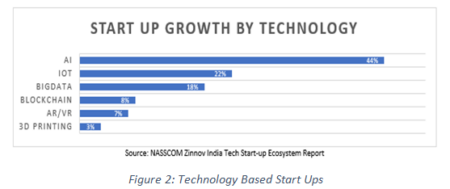
Krishna Ella, MD, Bharat Biotech is an outstanding example of techno-entrepreneurship. His company’s vaccine is in global demand, and his business scaled up during the challenging times of the pandemic, although his business isn’t a startup. Besides giants like Pfizer, Moderna and Astra Zeneca, Bharat BioTech now features companies that provide the COVID vaccine to the world. India is becoming a hub for entrepreneurship for the world!
When the economy was in deep paralysis for almost a quarter of 2020, digital platforms captured venture funds and investors’ eyeballs through mergers and acquisitions. Reliance’s Jio attracted the largest investments from companies like Facebook, Google and others. Traxcn – a company that follows the startup industry’s activities – values the total funding towards startup to be $11.5B in 2020, which is 10% lower than in 2019. These investments were spread across 924 deals – 14% higher than the previous year, implying a reduced average fund value. However, the fact is, in 2020, early-stage and bridge funding almost doubled, indicating that investors recognized the value in innovation.
Changes in the Environment – India the Hub for a Digital Startup
Total lockdowns, the fear of life and livelihood and the general sense of uncertainty demanded imaginative ideas and innovative actions to sustain business activities. Leveraging technology’s prowess was imperative as a near-complete overhaul of business processes, and the supply chains had to be done to deal with social distancing, work from home and stringent hygiene and safety factors. While some businesses perished – cinema, entertainment, travel – some others thrived – Health-tech, Foodtech, Edtech and Fintech.

Figure 1: Attractiveness to Investments by StartUp verticals in 2020
Startup companies offered niche and innovative solutions for specific business challenges which were largely unprecedented, using technologies like AI, Blockchain, Bigdata, IoT, Robotics, 3-D printing and VR/AR (collectively referred to as deeptech).These became attractive propositions for venture funding companies as the solutions developed had a global market almost ready to buy.
In India, Edtech (Byju’s, Unacademy, White Hat Jr., Upgrad), Food-tech (Swiggy, Dunzo, Zomato), Health-care (5C Network, Ekincare, Elucidata) and Fintech (PhonePe, Pine Labs, Zerodha) attracted a lot of funding as the complete lockdown, and social distancing norms gave rise to new needs and created new habits.
Tech-based and innovative solutions by startups (see figure 2 below) drew investors’ attention to India. As per Tracxn, India is only behind the US and China as the country for startups.

Between 2011 and 2017, India had 7 Unicorns ($1B or more in valuation), mainly in the e-commerce sector. Between 2017-2019 an additional 19 emerged from Edtech and Fintech sectors. In 2020, despite the lockdown, the 11 new unicorns from healthcare, Edtech and Fintech verticals brought the total to 37 Unicorns in India, which is much more than the UK (24), Germany (12) South Korea (11 ), Brazil and Israel (8 each), France (7) and Switzerland (5), making India the new hotbed for startups.
Growing Start-up culture and New Challenges
Why is the startup industry growing? Two possible reasons emerge.First, the pandemic’s positive impact is in providing an unprecedented opportunity to offer solutions at scale. The startup environment, coupled with India’s tech talent,has been tenacious and experimental and has not been stopped by the fears of failures. As the Prime Minister himself said, “the new, bold and fresh mindset of young entrepreneurs is the reason for the growth of India’s startup culture“.
The second reason is scarier. The rapid pace of change has led to a high level of skill mismatches, especially as organizations transition into the digital era. The pandemic has only fast-tracked the change almost like the virus itself mutating.The use of technology is making working teams smaller and organization structures flatter. It is also expanding the scope of work human beings are expected to do – the emergence of multidisciplinary roles – for which available skillsets are not adequate. The gap between the demand and supply of talent is only widening with the growth of startups that seek great skills in deeptech and business domains and creative thinking and people management skills for managing the business activities.
Role of Academia in a Developing Startup Environment
Management schools globally are rejigging their strategies and discovering new pedagogies, lest the Edtech startups disrupt them. However, the challenge is to balance the curriculum between conceptual and practical learning, principles of business management and capabilities of technological disruptions, in-depth knowledge developed through research and skills demanded by the current needs of the industry. But when the curriculum is directed towards entrepreneurship, new choices and freedom emerge.
IIM Udaipur launched the Digital Enterprise Management program – the only one-year, full-time MBA course that prepares leadership and managerial talents for the digital world – during the pandemic. By exposing students to technology and business concepts and enabling them with the traditional case study method and the modern experiential learning via doing real-life projects and using technologies for simulations, students get prepared for multidisciplinary roles in corporate and for converting their ideas into business cases as entrepreneurs. Students are also trained to develop courage and conviction and develop instincts besides using data models.
As the new India embarks upon its entrepreneurial journey of startups and is likely to become a global powerhouse, management education also needs to rediscover itself as the pandemic has indicated. India is a country for case studies – in the context of scale and complexities – in terms of demography, literacy, financial habits, social practices and beliefs, languages and freedom of expression. After implementing Aadhaar and UPI (Unified Payment Interface), which are technology-enabled platforms developed by technocrats who are, on average, less than 40 years old, India is the new tech startup destination for the world!
_______________________________________________
About the Authors:

Dr. Y Shekar is the Head – Centre for Digital Enterprise, which works on policies, practices and education in the digital space. He has over three decades of industry experience in the Information Technology vertical.

Uttara Krishnakumar is a student of the MBA in Digital Enterprise Management,with prior work experience in education, sports and media industries. She is an internationally certified sports coach and hosts the IIMU Entrepreneurship Podcast Series “Once Impossible”.
Stay connected with fellow students on PaGaLGuY for CAT Exam Discussion.
